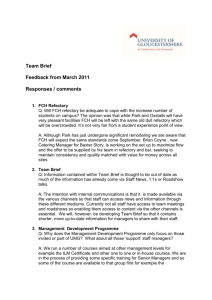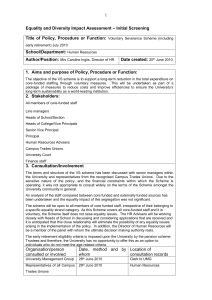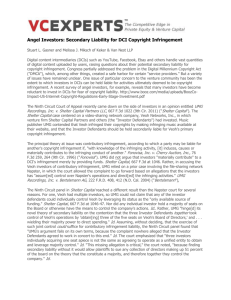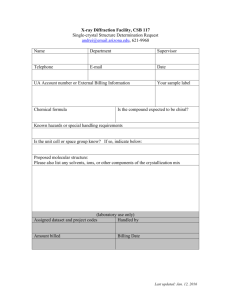general policy - Saint Louis University
advertisement
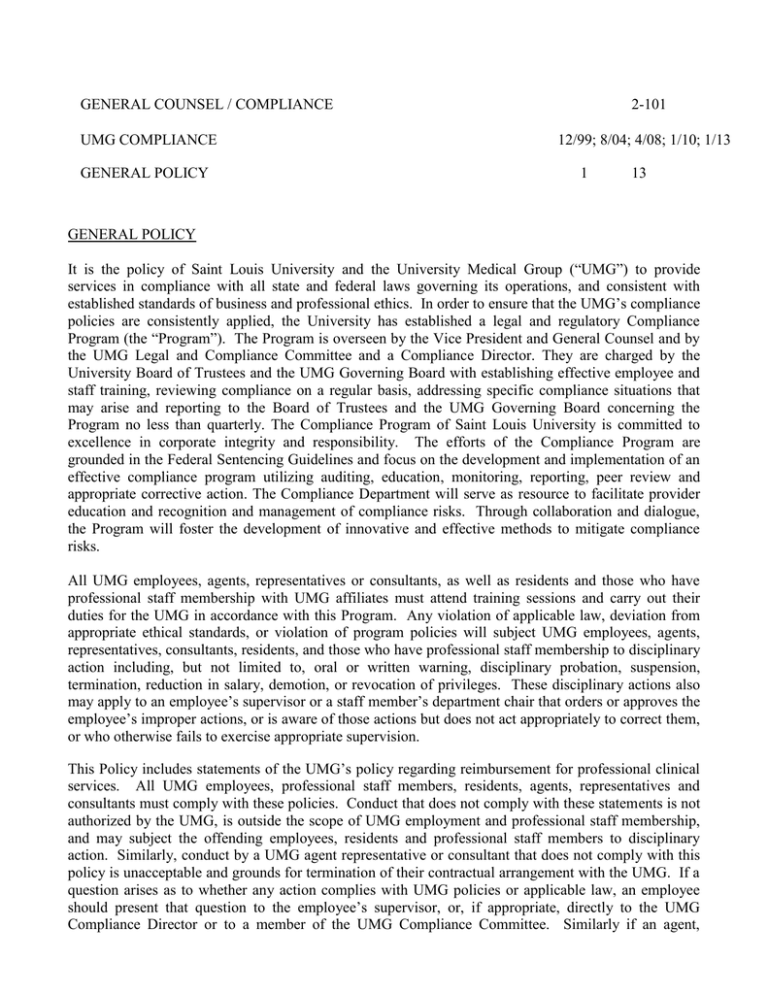
GENERAL COUNSEL / COMPLIANCE UMG COMPLIANCE GENERAL POLICY 2-101 12/99; 8/04; 4/08; 1/10; 1/13 1 13 GENERAL POLICY It is the policy of Saint Louis University and the University Medical Group (“UMG”) to provide services in compliance with all state and federal laws governing its operations, and consistent with established standards of business and professional ethics. In order to ensure that the UMG’s compliance policies are consistently applied, the University has established a legal and regulatory Compliance Program (the “Program”). The Program is overseen by the Vice President and General Counsel and by the UMG Legal and Compliance Committee and a Compliance Director. They are charged by the University Board of Trustees and the UMG Governing Board with establishing effective employee and staff training, reviewing compliance on a regular basis, addressing specific compliance situations that may arise and reporting to the Board of Trustees and the UMG Governing Board concerning the Program no less than quarterly. The Compliance Program of Saint Louis University is committed to excellence in corporate integrity and responsibility. The efforts of the Compliance Program are grounded in the Federal Sentencing Guidelines and focus on the development and implementation of an effective compliance program utilizing auditing, education, monitoring, reporting, peer review and appropriate corrective action. The Compliance Department will serve as resource to facilitate provider education and recognition and management of compliance risks. Through collaboration and dialogue, the Program will foster the development of innovative and effective methods to mitigate compliance risks. All UMG employees, agents, representatives or consultants, as well as residents and those who have professional staff membership with UMG affiliates must attend training sessions and carry out their duties for the UMG in accordance with this Program. Any violation of applicable law, deviation from appropriate ethical standards, or violation of program policies will subject UMG employees, agents, representatives, consultants, residents, and those who have professional staff membership to disciplinary action including, but not limited to, oral or written warning, disciplinary probation, suspension, termination, reduction in salary, demotion, or revocation of privileges. These disciplinary actions also may apply to an employee’s supervisor or a staff member’s department chair that orders or approves the employee’s improper actions, or is aware of those actions but does not act appropriately to correct them, or who otherwise fails to exercise appropriate supervision. This Policy includes statements of the UMG’s policy regarding reimbursement for professional clinical services. All UMG employees, professional staff members, residents, agents, representatives and consultants must comply with these policies. Conduct that does not comply with these statements is not authorized by the UMG, is outside the scope of UMG employment and professional staff membership, and may subject the offending employees, residents and professional staff members to disciplinary action. Similarly, conduct by a UMG agent representative or consultant that does not comply with this policy is unacceptable and grounds for termination of their contractual arrangement with the UMG. If a question arises as to whether any action complies with UMG policies or applicable law, an employee should present that question to the employee’s supervisor, or, if appropriate, directly to the UMG Compliance Director or to a member of the UMG Compliance Committee. Similarly if an agent, GENERAL COUNSEL / COMPLIANCE UMG COMPLIANCE GENERAL POLICY 2-101 12/99; 8/04; 4/08; 1/10; 1/13 2 13 representative or consultant is faced with any question that arises as to whether any action complies with UMG policies or applicable law, that individual should present the question to their primary contact at the UMG. All employees, professional staff members, residents, agents, representatives, and consultants must review this Manual from time to time to make sure that these policies guide their actions on behalf of the UMG. If, at any time, any employee, professional staff member, resident, agent, representative or consultant becomes aware of any apparent violation of the UMG’s policies, he or she should report it to his or her supervisor, primary contact or to the UMG Compliance Director. A Confidential Reporting Line (the “Compliance Help Line”) will be available. The telephone number(s) will be provided to all UMG employees, professional staff members, residents, agents, representatives and consultants upon employment and/or the engagement of their services. The telephone number will also be posted in UMG departments. All persons making such reports are assured that such reports are treated as confidential. The content of such reports will be shared only on a need-to-know basis, which will protect both the person making the report and persons who are the subject of such reports. The UMG will take no adverse action against persons making such reports in good faith, whether or not the report ultimately proves to be well founded. If an employee or professional staff member does not report conduct known to violate the UMG’s policies, that employee or professional staff member may be subject to disciplinary action, up to and including termination of employment or revocation of privileges. The legal statutes referenced in this Policy can be difficult to interpret. Many issues can only be decided on case-by-case determination. In addition, this Policy only generally deals with some of the more important legal principles involved in professional services reimbursement. Such specific mention is not intended to minimize the importance of other applicable laws, professional standards, or ethical principles, which may be covered in other UMG and/or Saint Louis University policies; consequently, any employee, professional staff member, resident, agent, representative, or consultant who is in doubt as to the propriety of a course of action must promptly communicate with his or her supervisor, or with the UMG Compliance Director before taking such action. BILLING AND CLAIMS BY THE UMG FOR PROFESSIONAL SERVICES 1. General Principles When claiming payment for professional services, the UMG and its employees have an obligation to patients, third party payors, and the state and federal governments to exercise diligence, care, and integrity. The right to bill the Medicare and Medicaid programs and other payors, conferred through the award of a provider or supplier number, carries a responsibility that must not be abused. The UMG is committed to assuring the accuracy of every claim processed and submitted by the UMG or on its behalf. Each individual responsible for entering billing charges, procedure codes, and other data entry on behalf of the UMG and its providers is GENERAL COUNSEL / COMPLIANCE UMG COMPLIANCE 2-101 12/99; 8/04; 4/08; 1/10; 1/13 GENERAL POLICY 3 13 expected to monitor compliance with applicable billing rules as a part of their assigned responsibilities. Any false, inaccurate, or questionable claims should be reported immediately to a supervisor or to the UMG Compliance Director. Deliberate false billing is a serious offense. Medicare and Medicaid rules prohibit knowingly and willfully making or causing to be made any false statement or representation of a material fact in an application for benefits or payment. It is also unlawful to conceal or fail to disclose the occurrence of an event affecting the right to payment with the intent to secure payment that is not due. Examples of false claims include: Claiming reimbursement for services that have not been rendered or have not been rendered by the practitioner in whose name they are submitted; Billing for services without documentation in the medical record to support the claim; Filing duplicate claims; “Upcoding” to more complex procedures or services, including evaluation and management services, than were actually performed, or to a more complex diagnosis than is appropriate; Including inappropriate or inaccurate costs on UMG and Medicare cost reports; Falsely indicating that a particular health care professional attended a procedure; Falsely certifying that a service is medically necessary; Knowingly billing for a length of stay beyond what is medically necessary; Knowingly billing for services or items that are not medically necessary; Knowingly billing for non-covered services; Failing to provide medically necessary services or items, regardless of reimbursement status; Routine waiver of payment of patient copayment and deductibles; Inaccurate specification on professional claims form of site of service (i.e., physician office versus outpatient department); GENERAL COUNSEL / COMPLIANCE UMG COMPLIANCE 2-101 12/99; 8/04; 4/08; 1/10; 1/13 GENERAL POLICY 4 13 Inappropriate professional billing in office setting for services rendered by non-physician practitioners (e.g., nurse practitioners); and Failure to correct errors in billing or to refund overpayments received. UMG employees, professional staff members, residents, its agents, representatives and consultants who prepare or submit claims should be alert for these and other errors. It is the intent of the UMG to carefully follow the Medicare rules on assignment and reassignment of billing rights. If there are any questions as to whether the UMG may bill for a particular service, either on behalf of an individual UMG provider or on its own behalf, these questions should be directed to the UMG Compliance Office or University legal counsel for review. UMG employees should not submit claims for other entities or claims prepared by other entities, including outside consultants, without verification or approval from the UMG Compliance Director. Special care should be taken in reviewing such claims, and UMG personnel should request documentation from outside entities if necessary to verify the accuracy of the claims. Contractual arrangements requiring global billing by another party, with a portion paid to the UMG for physician services should be reviewed by University legal counsel. In addition to criminal penalties, the Federal False Claims Act permits substantial civil monetary penalties against any person or entity that submits false claim or claims. The Act provides a penalty of triple damages, as well as fines up to $10,000 for each false claim. The individual or entity may also be excluded from participating in Medicare, Medicaid and other federally funded programs. Numerous other federal laws prohibit false statements or inadequate disclosure to the government. When such false or inadequate information is established, the laws mandate exclusion from Medicare, Medicaid, and other federally funded programs. It is illegal to make any false statements to the federal government, including statements on Medicare or Medicaid claim forms. It is illegal to use the United States Mail in a scheme to defraud the government. Any agreement between two or more people to submit false claims may be prosecuted as a conspiracy to defraud the government. The UMG promotes full compliance with each of the relevant laws by maintaining a strict policy of ethics, integrity, and accuracy in all its financial dealings. Each employee and professional, including outside consultants, who is involved in submitting charges, preparing claims, billing, and documenting services is expected to meet the standards of personal, professional, and institutional responsibility as established by this policy. These individuals are expected to acknowledge this policy and will be bound by it. 2. Medicare, Medicaid, TRICARE GENERAL COUNSEL / COMPLIANCE UMG COMPLIANCE 2-101 12/99; 8/04; 4/08; 1/10; 1/13 GENERAL POLICY 5 13 In billing for professional services, particular attention must be paid to current Medicaid, Medicare and TRICARE regulations relating to physician and other provider services, including: 3. (a) Current coding requirements; (b) Teaching Physician Medicare regulations; (c) Non-covered services, including investigational devices and drugs; and (d) Billing for services “incident to” a physician’s services. UMG Policies The UMG has adopted the following specific rules to ensure effective compliance with billing requirements. (a) Teaching physicians are responsible for complete, accurate, dated and legible documentation of services rendered; (b) Clinical chairs and supervisors are responsible for implementing professional documentation and billing policies within their respective departments; (c) Providers are responsible for the appropriate coding for all patient services; and (d) Medical record documentation includes both electronic and paper files. Medical record documentation should be supplemented or corrected only if there is a clear, supported basis for the change. Any change should be signed and dated when changed as a correction and consistent with UMG policy guidelines. No record should be removed from a file, deleted, or destroyed without the express approval of the UMG Compliance Director or University legal counsel. Disputed medical documentation compliance and audit findings should be reviewed by the UMG Compliance Director or University legal counsel before any corrections are made. (e) With the exception of certain evaluation and management services, teaching physician billing to all payors must conform to the following standard: When a trainee participates in a service furnished in a teaching setting, physician fee schedule payment will be sought only if the teaching physician is present and directly provides and participates in the care during the key portion(s) of the service and procedure, including physical presence during the GENERAL COUNSEL / COMPLIANCE UMG COMPLIANCE GENERAL POLICY 2-101 12/99; 8/04; 4/08; 1/10; 1/13 6 13 key portions of a service in which a resident provided assistance for which payment is sought. (emphasis added) The exceptions apply to certain low- and mid-level evaluation and management services furnished by residents in particular outpatient settings. Furthermore, application of the exceptions must be approved by the Medicare carrier and must be consistent with the most recent Primary Care Exception Rule. (f) A. Corporate compliance policy for proper CPT-coding, includes compliance with the requirements listed in the appendix, “E & M Documentation Guidelines, Effective August 5, 1995” and “Supervising Physicians in Teaching Settings, Effective July 1996,” and the Revision to “Supervising Physicians in Teaching Settings,” Effective November 2002, covering: Evaluation and Management Services; Minor and Endoscopic Procedures; Major Procedures; High Risk Procedures; Time-based Services; Radiology, Pathology and other Diagnostic Services; Anesthesia; Psychiatry; OB/GYN; and Assistant at Surgery. Training/Education All UMG providers and residents must satisfactorily complete the approved basic compliance program course developed and offered by the UMG Compliance Director within six (6) months of the adoption of this Program and within one (1) month for new GENERAL COUNSEL / COMPLIANCE UMG COMPLIANCE GENERAL POLICY 2-101 12/99; 8/04; 4/08; 1/10; 1/13 7 13 hires. The UMG Compliance Director will assist in identifying UMG personnel and agents who must participate in the Provider Reimbursement Compliance Training Program. All newly hired personnel in the identified positions must complete the Program before independently providing reimbursement-related services. Billing privileges will be withheld until the compliance training is completed. All UMG providers, residents, and staff designated by the UMG Compliance Director shall participate at least annually in training scheduled and offered by the UMG Compliance Director. Employees and other staff whose performance indicates a need for additional training will be required to successfully complete additional training. B. Routine Internal Compliance Audit Policies University legal counsel has directed the UMG’s internal compliance auditing staff and clinical departments to audit UMG’s billing for physicians’ services and supporting documentation for compliance with billing rules and for effectiveness in billing for services rendered. Audit reports are to be made available to University legal counsel (see Section C). The methodology used for audits will be approved by the UMG Compliance Director. The compliance of the UMG billing staff and members of each clinical service will be audited on a regular basis. Audits will include a review of the original charge documentation/encounter form, billing information and the medical record. The medical record review will include the legibility of entries, as well as compliance with coding, Teaching Physician regulations, and other requirements. Each clinical department and billing service is responsible for maintaining regular selfmonitoring quality reviews. The following represents the parameters of a quality review assessment: Comparing documentation in the medical record to the procedure code selected on the encounter form; Appropriate documentation in the medical record of teaching physician presence, if applicable; Comparing the procedure code on the encounter form to the procedure code billed; Physician signature on the encounter form; Specificity of CPT or ICD-9-CM coding; GENERAL COUNSEL / COMPLIANCE UMG COMPLIANCE GENERAL POLICY 2-101 12/99; 8/04; 4/08; 1/10; 1/13 8 13 Use, or lack, of modifiers; Overall accuracy in charge capture, dates billed, insurance billed, etc.; and Comparing professional billing by the physician with UMG affiliated facilities billing, when related. Department quality reviews shall be performed on a regular basis. Written summaries must be reviewed and acknowledged by the Department or Division Chair. All reports will be reviewed by the UMG Compliance Director and the UMG Legal and Compliance Committee as part of their standing agenda for compliance review. If a compliance issue is identified in a department quality review, the UMG Compliance Director shall be notified immediately. Based on a review of the findings with departmental personnel and University legal counsel, a corrective action plan will be developed if the situation warrants. The results of audits will be shared with the General Counsel and the UMG Legal and Compliance Committee (on a confidential basis) to assist in identifying areas for training emphasis. C. Routine Audit Reports The internal compliance audit staff will provide regular reports to the General Counsel, the UMG Compliance Director and the UMG Legal and Compliance Committee. The UMG Compliance Director, with the assistance of University legal counsel, will be responsible for developing and implementing appropriate corrective action plans for any issues of non-compliance detected during the audits. Confidential follow-up reports will be provided to University legal counsel and the UMG Legal and Compliance Committee. D. Coordination with Clinical Departments The UMG Compliance Director will coordinate the Compliance Department’s audit and corrective action activities with the clinical department leadership within the UMG. Physician-specific information will be shared with the cognizant clinical chair to promote effective monitoring and educational efforts within each clinical service. Applicable medical peer review confidentiality will be observed. E. Corrective Action GENERAL COUNSEL / COMPLIANCE UMG COMPLIANCE GENERAL POLICY 2-101 12/99; 8/04; 4/08; 1/10; 1/13 9 13 Payments received in error will be refunded, as appropriate. Other corrective action will be instituted to the extent necessary. The UMG Legal and Compliance Committee will assess the need for external, independent audits of UMG billing for physician services, taking into account the results of the routine internal audits. As noted in the General Statement of Policy, UMG employees, professional staff members, residents, its agents, representatives, and consultants, whose actions are not consistent with the UMG’s Compliance Program will be subject to disciplinary action. A first compliance deficiency will normally result in education and remediation. In the event of a second deficiency within a 12 month period or a serious violation, the UMG Legal and Compliance Committee or its designee will meet with the individual, the Department Chair and the Compliance Director to review the matter and make recommendations on a formal corrective action plan including any potential disciplinary action. A serious compliance violation may consist of one or more of the following: the intentional or reckless disregard of applicable laws or UMG billing and compliance policies, a significant adverse financial or legal risk to the University and the UMG, a pattern of recurring compliance deficiencies, or a failure to comply with a current corrective action plan. While the University and the UMG generally follow a progressive approach of education and discipline to eliminate or remediate compliance deficiencies, more serious corrective action may be initiated depending upon the gravity of the conduct and the circumstances in any particular case. Discipline will be initiated consistent with the specific policies and procedures applicable to faculty, staff and administrators. In those situations where the UMG Legal and Compliance Committee or its designee has identified the need for a corrective action plan (including disciplinary measures), appropriate steps will be taken to notify the Chair of the involved Department or responsible University administrator in writing of the findings and required action steps with sufficient detail to enable the Individual and Chair or responsible University administrator to develop a corrective action plan for approval by the Compliance Director. The Compliance Director will review the corrective action plan and respond to the department within 5 days of receipt. Once the plan is deemed acceptable, the Committee or its designee will request that the Chair or responsible University administrator confirm that the corrective action plan has been implemented within 10 days of receipt of the approval notice. If the Chair or responsible University administrator fails to confirm implementation of the requested corrective action plan, the Committee or its designee shall send a notice to the Dean of the School of Medicine or appropriate administrator requesting a written confirmation that the plan has been implemented. In the event that the Dean or the appropriate administrator does not confirm implementation of the plan or request clarification or amendment within 5 days after receipt of the Committee’s notice, the Committee or its designee will inform the Provost or other appropriate University administrators of the need for the corrective GENERAL COUNSEL / COMPLIANCE UMG COMPLIANCE GENERAL POLICY 2-101 12/99; 8/04; 4/08; 1/10; 1/13 10 13 action plan and the response, if any, of the Chair and/or the Dean or other responsible University administrator. The UMG will not bill for services of providers who fail to complete the required Compliance Program training or whose documentation or billing practices in the opinion of the UMG Compliance Committee show a pattern of non-compliance with rules for documentation or billing. At any step in this process the provider may respond in writing to the UMG Legal and Compliance Committee, their department chairperson or the Compliance Director. The UMG will indemnify in the manner provided by the Saint Louis University Bylaws any person who is a party to any pending action, lawsuit or investigation by reason of the fact that he or she is or was a director, officer, employee or agent of the University; however, the UMG will not indemnify any person who is finally adjudged to have engaged knowingly, fraudulently or deliberately in dishonest or willful misconduct. UMG Compensation Plan In cases involving a serious violation, the Provider’s Chair will immediately withhold the supplemental portion of the Provider’s salary for a minimum period of one (1) month and suspend the Provider’s eligibility to receive incentive payments for one (1) fiscal year. Nothing contained in the UMG Compensation Plan or this policy shall be deemed to limit the UMG’s right to impose a greater sanction or take additional, immediate action to address serious compliance violations. Reporting Line for Suspected Infractions The UMG has established a confidential internal reporting “hotline” for the use of employees, professional staff members, residents, its agents, representatives and consultants who believe an action has occurred that is not in compliance with UMG policies or applicable regulations. All reports will be promptly reviewed and investigated by the UMG Compliance Director or his/her designee, under legal supervision. Privileged and confidential reports of all investigations will be maintained and shared with UMG officials on a need-to-know basis. If the subject of a complaint is a physician, the investigation will be conducted in accordance with the confidentiality provisions pertaining to “medical peer review committees” under state law, and disciplinary actions affecting staff privileges will be conducted in accordance with the professional staff bylaws of the University Medical Group. GENERAL COUNSEL / COMPLIANCE UMG COMPLIANCE GENERAL POLICY 4. 2-101 12/99; 8/04; 4/08; 1/10; 1/13 11 13 Patient Referrals That Restrict Billing for Services Patient referrals are important to the delivery of appropriate health care services. Patients are admitted, or referred, to UMG affiliates by their physicians. Patients cared for by the UMG, whether as inpatients or outpatients, may be referred to other facilities, such as skilled nursing or rehabilitation facilities. Patients may also need durable medical equipment, home care, pharmaceuticals, oxygen, and may be referred to qualified suppliers of these items and services. The UMG’s policy is that patients, or their legal representatives, are free to select their health care providers and suppliers subject to the requirements of their health insurance plans. The choice of a physician, a diagnostic facility or a supplier should be made by the patient, with guidance from his or her physician as to which providers are qualified and medically appropriate. Physicians and other health care providers may have financial relationships with the UMG and its affiliates. These relationships may include compensation for administrative or management services, consulting arrangements, income guarantees, loans of certain types, or free or subsidized services. A federal law known as the “Stark law” [42 U.S.C. § 1395nn] applies to any physician who has, or whose immediate family member has, a “financial relationship” (as defined by this statute) with an entity such as Saint Louis University Hospital (“SLUH”) The Stark Law prohibits referrals by that physician to SLUH or such other entity for the provision of certain designated health services reimbursed by Medicare and Medicaid, unless the statute exempts the relationship. If a “financial relationship” exists, billing for such referrals is prohibited unless a specific exception is met. The UMG and SLUH require that each “financial relationship” with a potentially referring physician or his or her family member fit within one of the exceptions to the Stark law. Responsibility for evaluating “financial relationships” with physicians lies with University legal counsel, but each department chair, the medical staff administration, and the payroll department are expected to monitor “financial relationships” and report any potential issues to University legal counsel. The Stark law currently applies to the following types of referrals for UMG affiliated billed services: Clinical laboratory; Physical therapy; Occupational therapy; Radiology (including MRI, CT, ultrasound, and mammography); GENERAL COUNSEL / COMPLIANCE UMG COMPLIANCE GENERAL POLICY Durable medial equipment, parenteral and enteral nutrients; Equipment and supplies; Prosthetics and orthotics; Home health services; Outpatient prescription drugs; Inpatient and outpatient hospital services; and Radiation therapy services and supplies. 2-101 12/99; 8/04; 4/08; 1/10; 1/13 12 13 The exceptions under the Stark law are complex. Several general rules apply to business relationships. For example, leases for physician office space and personal service contracts with physicians must be in writing, and signed by the parties and must be for at least one year. Any premises leased must be specified and must not exceed the space reasonably needed for the physician’s legitimate purposes. Rental charges must be set in advance, at fair market value, without regard to the volume or value of referrals by the physician. A lease must be commercially reasonable even if no referrals were made between the parties. Similarly, a personal service contract must specify the services to be provided by the physician to the UMG affiliates, which must be reasonable and necessary for legitimate purposes. Compensation paid to physicians must also be set in advance at fair market value, be unrelated to the volume or value of referrals, and be commercially reasonable. Contract services may not involve the counseling or promotion of an illegal business arrangement. Other exceptions include Physician incentive plans, bona fide employment relationships, and physician recruitment. The Stark law does not impact remuneration unrelated to the provision of designated health services. Physicians purchasing clinical laboratory services or other items or services from SLUH must pay fair market value. An arrangement whereby SLUH bills for a group practice may be acceptable if it was in place prior to December 19, 1989, and meets certain other requirements. A pathologist, radiologist, or radiation oncologist may provide SLUH laboratory, pathology, diagnostic radiology, or radiation oncology services on his own order or on a consultation request from another physician. Penalties for violating the Stark law include (i) no Medicare or Medicaid payment for the service referred illegally; (ii) a refund to the beneficiary of any coinsurance amounts collected; (iii) fines of up to $15,000 levied on both the referring physician and the entity for each service referred GENERAL COUNSEL / COMPLIANCE UMG COMPLIANCE GENERAL POLICY 2-101 12/99; 8/04; 4/08; 1/10; 1/13 13 13 illegally, plus additional fines based on the amounts billed; (iv) civil monetary penalties of up to $100,000 plus other assessments; and (v) exclusion from the Medicare or Medicaid programs. Physicians will be asked to report annually any “financial relationship,” as defined by Medicare, with SLUH or any other health care entity, group or organization.

